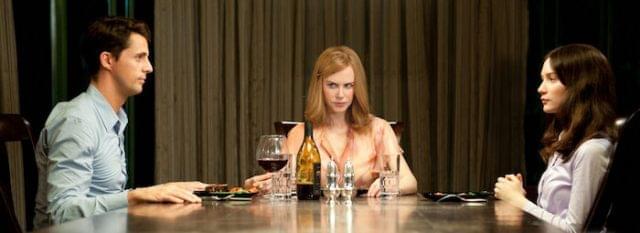
“Stoker” is the first English-language film by Korean macabre master Park Chan-wook, whose violent, Tarantino-esque tales (“Oldboy,” “Joint Security Area”) have been providing perverse pleasures to international audiences since the turn of the century. His customary brutality is toned down a bit (in relative terms, anyway), but his abiding themes of vengeance, family, and death are in full force. And while it’s entirely possible that the movie has more style than substance — wow, what style!
Our heroine is India Stoker (Mia Wasikowska), a morbid, withdrawn rich girl whose beloved father (Dermot Mulroney) dies in a freak accident on her 18th birthday, doing little to lighten her Wednesday Addams-ish demeanor. Cooped up in a sprawling Connecticut mansion with doting servants and a mother, Evelyn (Nicole Kidman), who’s barely functioning, India has no companions. Her classmates regard her as enigmatic and unapproachable, making her an object of fascination as well as mockery.
Who should appear at the late Mr. Stoker’s wake but his brother, Charlie (Matthew Goode), a rakish world traveler whose existence India was previously unaware of. (We catch snippets of hushed conversation among the wake’s guests — one of several instances of the film revealing information to us indirectly, as if we share India’s knack for eavesdropping, her ability to hear things other people don’t.) India is suspicious of Uncle Charlie, but Evelyn is relieved that her brother-in-law plans to stay awhile. “How do you spend your days?” he asks her. “I want to know my brother’s wife.” Fans of the Old Testament may hear an alarm go off.
Thus begins a psychosexual thriller about India’s coming of age, which Uncle Charlie plays a part in — but not in a creepy way. Well, yes, in a creepy way. But not in THAT creepy way. India tells us in the opening narration that she has had a “lifetime of longing, longing to be rescued,” and the film is about her developing from a caterpillar into a beautiful, potentially terrifying butterfly. She has experiences with boys from school (Lucas Till, Alden Ehrenreich) that help her learn what she wants. Wasikowska’s performance is devilishly good in these scenes: you can see in her face that India is surprised by what she learns in her process of self-discovery. (We are more shocked.) But when all the dark mysteries are eventually solved, some of them in grimly humorous fashion, there’s a matter-of-factness to it. “Just as a flower does not choose its color, we are not responsible for what we come to be,” India says.
Biblical, literary, and cinematic references are plentiful in “Stoker,” which was written by actor Wentworth Miller (TV’s “Prison Break”). Hitchcock’s “Shadow of a Doubt” is an obvious influence, and the allusion to Bram Stoker isn’t coincidental, though there are no literal vampires here. As always, Park composes his shots carefully and with a flair for invention (aided by Chung Chung-hoon, his regular cinematographer), making the film as interesting to look at as it is to watch. Now, whether there’s any real purpose in a close-up of Nicole Kidman’s golden hair dissolving seamlessly into a shot of a wheat field is open to debate. But there’s no question it looks cool.
There’s a lot of coolness on display here, as well as chilling images of violence and some demented Hitchcockian fetishes. Some of the dazzle is symbolically useful, like the intense and highly physical piano duet India and Charlie play. Some of it is merely window-dressing, like a scene between India, Charlie, and Evelyn that’s staged in such a way that no more than two of them ever appear in the same shot. But it’s all marvelously assembled by a craftsman who takes pleasure in unsettling our minds while he messes with our eyes.
B+ (1 hr., 39 min.; )
Originally published at About.com.





